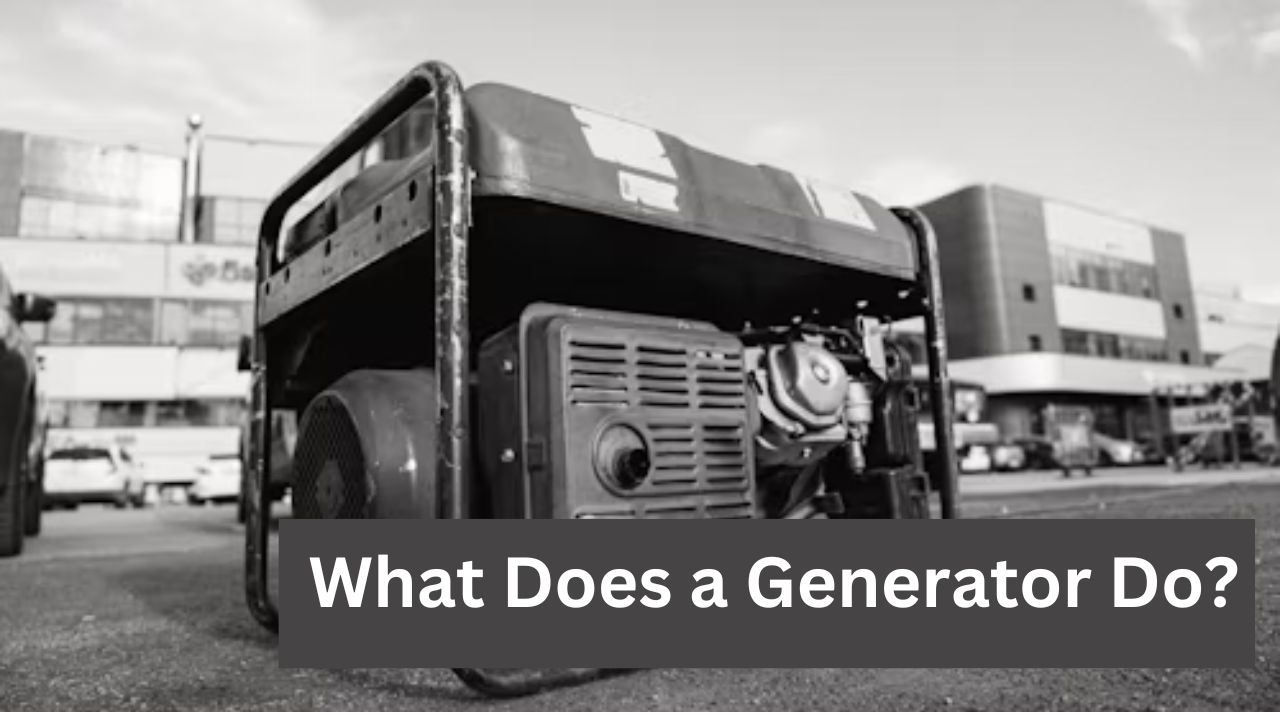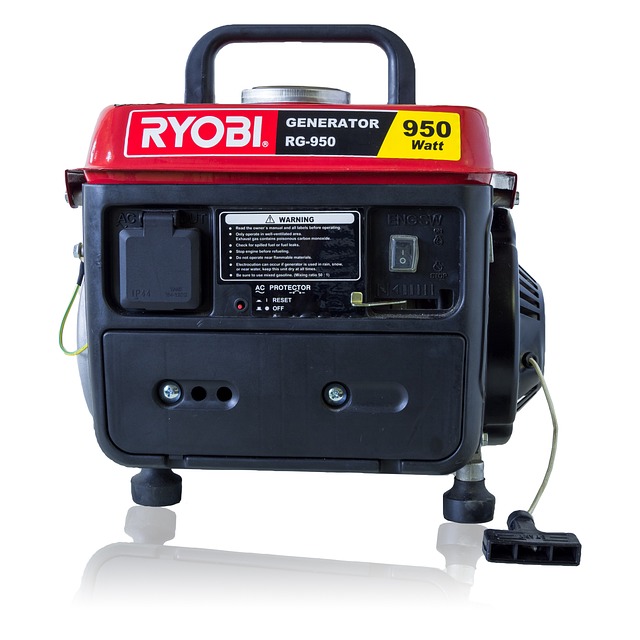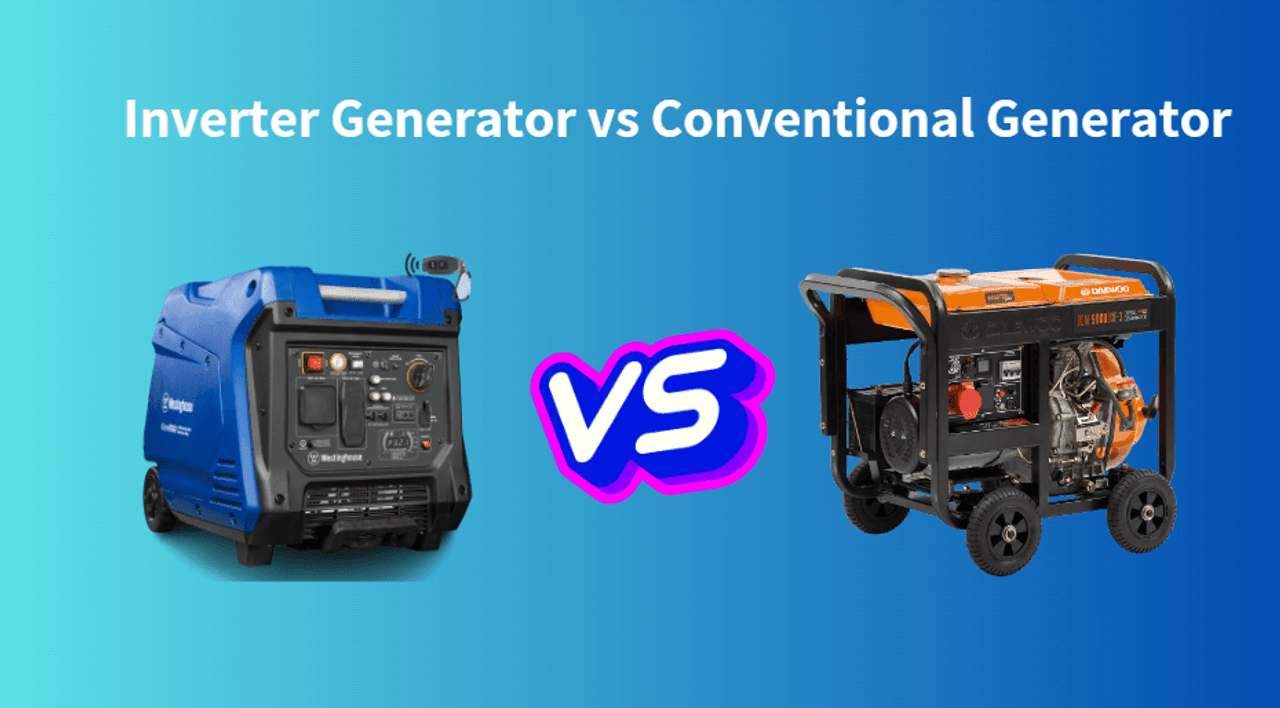Inverter Generator vs Conventional Generator: Which One is Better to Choose?
When it comes to inverter generator vs generator, the main difference lies in how they produce power. Inverter generators deliver clean, stable power using advanced electronics, making them perfect for sensitive electronics like laptops and phones. They’re also quieter, more fuel-efficient, and lighter.
Conventional generators, on the other hand, generate power through a mechanical alternator. They’re more robust and can handle larger loads but tend to be noisier, less efficient, and may not be as safe for delicate devices.
Choosing the right generator depends on your needs. In this blog, we’ll compare the two types in detail and help you decide which is the best fit for your next adventure.
What is a conventional generator?

A conventional generator is also called a traditional generator. It changes mechanical energy into electrical energy. It does this by burning fuel, usually gasoline or diesel. These generators have been used for many years to power homes and industrial sites.
It works by using a combustion engine that drives an alternator. The engine burns fuel and creates mechanical energy. This mechanical energy spins the alternator, producing electricity in the form of alternating current (AC). The electricity produced is then made available through outlets on the generator.
Fuel types for conventional generators
Gasoline generators
Gasoline generators are a popular choice for homeowners and light commercial use. They are widely available and often less expensive than propane or dual-fuel options. You can easily find them in most hardware stores. However, relying on gasoline can lead to fluctuating prices, which can increase operating costs, especially if the generator is used frequently.
Dual fuel generators
Dual fuel generators operate on two types of fuel, propane (LPG) and gasoline. An example of a dual-fuel generator is the EcoFlow Smart generator, which pairs well with the Lycan 5000 power box, providing backup power when power is out.
Even if you mainly rely on solar energy, incorporating a dual-fuel generator into your setup enhances your resilience. It ensures you have alternatives during extended outages. This flexibility makes dual-fuel generators a valuable addition to any energy management plan.
Propane generators
Propane generators use propane, a cleaner-burning fossil fuel that produces fewer emissions compared to gasoline or diesel. This makes them particularly beneficial for commercial and industrial settings that require stable power. Propane is also a reliable choice during emergencies and extended power outages. One key advantage is its long storage life, allowing you to stock up without worrying about fuel degradation.
Solar generators
Solar generators convert sunlight into DC power using solar panels, which is then transformed into AC by an inverter. They are eco-friendly and work best for home backup, camping, RV travel, and off-grid living. Solar generators can significantly reduce your dependence on the electrical grid.
When it comes to solar generators, the Renogy 200W 12V Monocrystalline Solar Panel is an all-in-one solar power generation backup solution, providing a robust solution to meet your electricity needs without relying on fossil fuels.
What is an inverter generator?

An inverter generator is the latest type of generator that uses electronic innovations to create much cleaner and stable power. Unlike traditional generators, these converters change the AC power into DC first, then convert it back into AC. As a result, they can match the speed of the engine toward the requested power. This results in more efficiency, much less noise, and suitability for sensitive electronics.
Inverter generators use self-contained inverter modules to control the generated power. It produces AC power, which is converted into DC power. Then the DC power is inverted back to stable AC output, mainly with a pure sine wave. This results in a cleaner and constant flow of electricity.
Key benefits of inverter generators
Inverter generators are becoming popular due to their reliability and flexibility. Here are a few reasons why it would be a wise choice.
- Quiet operation: Inverter generators tend to be quieter compared to the traditional ones. They are best for use in home settings or at an outdoor campsite among nature.
- Fuel efficiency: They adjust engine speed based on power needs. This means they use less fuel. You can keep running them without going in for refueling for quite a long time.
- Portable: Inverter generators are more compact and lighter in weight. They are easier to move around and store, perfect for outdoor fun with limited space.
- Parallel compatibility: It is possible to connect a number of inverter generators to provide more power. This becomes very useful when using large appliances or multiple devices simultaneously.
- Eco-friendly: Their emissions are far much lower than those of generators. If someone is looking for zero emissions, then the choice would be the EcoFlow DELTA Pro as it runs solely on clean energy.
Inverter Generators vs Generators: 8 Key Differences
When you are deciding between an inverter generator and a conventional one, it’s good to know what makes them different. Here’s a simple breakdown.
| Feature | Inverter Generator | Conventional Generator |
| Power Quality | Stable, clean output for sensitive electronics | Less stable; unsuitable for delicate devices without additional protection |
| Noise | Operates quietly | Loud operation |
| Fuel Efficiency | Adjust engine speed to save fuel and extend runtime | Run a full speed, consuming more fuel regardless of demand |
| Size and Portability | Compact and lightweight, easy to transport and store | Bulky and heavy, harder to move and store |
| Price | Higher upfront cost | Generally more affordable for high-power needs |
| Power Capacity | Best for smaller loads like RVs, camping or homes essentials | Suitable for powering large appliances and heavy equipment |
| Maintenance |
Requires minimal maintenance; designed for long-term reliability. |
Needs regular maintenance due to simpler yet heavier-duty components. |
1. Power Quality
Inverter generators produce clean, stable power with low harmonic distortion, making them ideal for sensitive electronics like laptops, phones, and TVs.
Conventional generators, however, often produce power with higher distortion, which can damage delicate devices if not managed properly.
2. Noise Level
Inverter generators are known for their quieter operation. Their advanced technology allows them to adjust engine speed based on the power demand, reducing noise when less power is needed.
Conventional generators are louder because they run at a constant speed, even when the power demand is low, making them less ideal for noise-sensitive environments.
3. Fuel Efficiency
Inverter generators are more fuel-efficient, adjusting their engine speed to match the load. This means they consume less fuel during low-demand periods, giving you longer run times on a single tank.
Conventional generators typically consume more fuel because they run at full capacity regardless of the load, leading to shorter run times and higher operating costs.
4. Size
Inverter generators are more compact and lightweight, often designed with portability in mind. They are easy to transport and store, making them ideal for camping trips or small spaces.
Conventional generators, by contrast, are bulkier and heavier, especially as power capacity increases. They may be harder to move and require more storage space.
5. Price
Inverter generators tend to be more expensive upfront due to the advanced technology and quieter operation. Conventional generators are typically more affordable, especially for those on a budget or those who need a generator for high-power applications like construction sites.
6. Power Output Range
Inverter generators are usually best for smaller, lower-power applications—think camping, RVs, or small household appliances. While some models can handle higher loads, they may not be suitable for powering large appliances or heavy-duty tools.
Conventional generators are available in a wide range of power capacities, often providing much higher output, which makes them suitable for larger applications, including home backup power or running heavy machinery.
7. Portability
Inverter generators are designed for easy transport, with ergonomic handles or wheels often included. Their compact size also makes them a favorite for recreational use.
Conventional generators are less portable due to their larger size and heavier build, which can make them cumbersome for frequent relocation.
8. Maintenance
Inverter generators generally require less maintenance. Due to their efficient design and fewer moving parts, they tend to last longer and need less frequent servicing. Conventional generators often need more maintenance, especially if they are used frequently. Their larger engines and less efficient systems may wear out more quickly and require more upkeep.
Which one should you choose?
It's pretty tough to determine which one to choose between an inverter generator and a normal generator. Some important things need to be considered, including power needs, portability, and budget.
An inverter generator is probably the way to go if you need a generator for camping or outdoor activities. Inverter generators are excellent for running sensitive electronics, such as laptops or mobile phones. They produce cleaner energy and are much quieter than conventional ones. Besides, they give up to 30% greater fuel efficiency; thus, it is an ideal choice for small backup power at your house or for recreational uses.
If you do need much greater power output to run big appliances and or heavy-duty machines, then a traditional generator might be even more appropriate for your purposes. They could power several machines at once. Also, they possess the power level to take on mighty projects. Other than that, these traditional generators are more frequently cheaper in terms of upfront expenses. This is a pretty good reason to select one, especially when it comes to a construction site, large RV, or home with power outages going on for longer than usual.
Both types of generators have unique benefits. Consider the purpose of the generator as well as where you will use it to make a wise decision.
Final Thoughts
Deciding between an inverter generator vs generator depends on your priorities. For those who need something quiet, portable, and efficient—like for camping or powering sensitive devices—an inverter generator is the perfect fit. On the other hand, conventional generators are better suited for high-power needs, like running heavy equipment or providing home backup during outages, especially if you’re on a budget.
Consider your power requirements, noise tolerance, and where you’ll use the generator. Whether you choose modern convenience or raw power, the right generator will keep you prepared for any situation.
FAQs
Do inverter generators last as long as regular generators?
Yes, inverter generators tend to have a longer service life than regular generators, though you have to pay more upfront for them. That said, their life depends on the quality, overall use, and how you take care of them. An average inverter generator, if properly used, can last anywhere between 10000 and 2000 running hours, or 10 to 15 years.
What are the disadvantages of an inverter generator?
Despite being popular and useful for modern applications, the biggest disadvantage of modern inverter generators is the high cost. An average inverter generator can cost you up to $1000, as compared to traditional generators with an average cost of $170 to $400. Moreover, they use gasoline as fuel, which can exhaust gases like carbon monoxide, being harmful for indoors.
Can an inverter generator power my whole house during an outage?
It depends on the generator's wattage and your home's power needs. Most inverter generators are designed for smaller loads, such as essential appliances and electronics. For powering an entire house, a high-capacity conventional generator or multiple inverter generators connected in parallel may be required.











